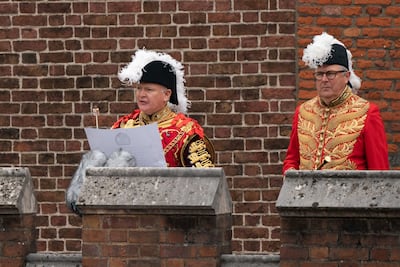The death of Queen Elizabeth II and the accession of the new king offers a glimpse into an archaic world of titles. Many people did not know these still existed in modern Britain, which is dominated by long-standing families loyal to the crown.
Overseeing the funeral plans for the royal family is the Earl Marshal, who is the Duke of Norfolk. This is a position his family have occupied in the hierarchy of the aristocracy for hundreds of years.
The departure of the queen's coffin for the four-day lying in state at the Palace of Westminster on Monday was overseen by the Lord Great Chamberlain. He walked ahead of the bearer party, having put together the lying in state in the Great Hall.
Ever since the monarch died on September 8, the protocol-heavy events, broadcast around the world, have featured a carousel of titled characters whose positions have existed for centuries solely to uphold ancient traditions.
The Earl Marshal

This is a hereditary role held by the highest-ranking nobleman in England, the Duke of Norfolk, who has been instructed by King Charles III to lead the arrangements for the state funeral for the late monarch. It is a position of destiny for the 18th duke, given that his predecessors carried out similar duties.
It is the eighth of the great offices of state in the UK, ranking beneath the Lord High Constable but above the Lord High Admiral.
The Earl Marshal is responsible for arranging the state opening of Parliament, state funerals of sovereigns and the accession of new monarchs.
He is the leading officer of arms, oversees the College of Arms and is the sole judge of the High Court of Chivalry. He is also believed to be one of three people in England who could claim the role of chief butler.
The position is currently held by the 18th Duke of Norfolk, Edward Fitzalan-Howard, 65, who inherited the title when his father died in 2002. The duke is a peer in the House of Lords and the most senior lay member of the Roman Catholic Church in Britain.
Like all past dukes of Norfolk, he is descended from Edward I and he oversaw from the balcony of St James’s Palace the proclamation of King Charles on Saturday.
Lord Great Chamberlain

King Charles appointed Lord Carrington, whose late father served as foreign secretary under Margaret Thatcher, to the post.
Rupert Carrington, 73, has charge over the Palace of Westminster. He holds the right to dress the monarch on coronation day, to serve the monarch water before and after the coronation banquet, and will be involved in investing the king with the insignia of rule.
He carried out his first duties as he greeted the royal couple when they arrived at Westminster Hall in London for the new king's speech to Parliament on Monday.
Garter King of Arms

The Garter King of Arms proclaimed King Charles III as the new monarch in a ceremony at St James’s Palace after the death of the queen.
David Vines White read the principal proclamation on the balcony above Friary Court.
State trumpeters then sounded the royal salute, as a military band played the national anthem.
The role was created by King Henry V in 1415 as the most senior position among the three kings of arms. He is the senior officer of the College of Arms, the heraldic authority with jurisdiction over England, Wales and Northern Ireland.
Mr Vines White is responsible for the succession of peerage titles, royal ceremonies and the control of the law of arms in England and Wales. He has served as the Garter King of Arms since 2021.
The Lord Lyon King of Arms

The Lord Lyon King of Arms read the proclamation to the people of Scotland on Sunday, announcing the accession of Charles III to the throne.
Wearing a large feathered hat and after a fanfare of trumpets, Joseph Morrow made the proclamation, stating: “God save the king.”
The national anthem was then sung as the Lord Lyon King of Arms led three cheers for the new monarch.
The role functions as head of the Lyon Court and is the most junior of the great officers of state in Scotland. The holder is responsible for regulating heraldry, issuing new grants of arms to people or organisations.
He also acts as judge of the world’s oldest daily functioning heraldic court, the Court of the Lord Lyon, which maintains the register of grants of arms.
Dr Morrow was appointed to office in 2014 and previously served as the queen’s commissioner for the Mental Welfare Commission for Scotland.
Norroy and Ulster King of Arms

The Norroy and Ulster King of Arms, Robert Noel, read the proclamation of the new king at Hillsborough Castle in Northern Ireland.
Mr Noel formally declared the accession of Charles III after the queen’s death. He is one of three senior officers of arms at the College of Arms in London.
Mr Noel trained as a shipbroker, then as a library assistant at the College of Arms, before joining the auctioneers, Christie's of London. He is a freeman of the City of London and has been admitted as a liveryman of the Glaziers' Company. He was appointed Norroy and Ulster King of Arms in 2021.
As in the other capitals where the proclamation was read, Mr Noel raised three cheers for the new monarch.
The Norroy is the provincial king of arms at the College of Heralds, with jurisdiction over England north of the Trent, and Northern Ireland.

